Food History Almanac
Rowman & Littlefield Studies in
Food and Gastronomy
General Editor: Ken Albala, Professor of History, University of the Pacific (kalbala@pacific.edu)
Food Studies is a vibrant and thriving field encompassing not only cooking and eating habits but issues such as health, sustainability, food safety, and animal rights. Scholars in disciplines as diverse as history, anthropology, sociology, literature, and the arts focus on food. The mission of Rowman & Littlefield Studies in Food and Gastronomy is to publish the best in food scholarship, harnessing the energy, ideas, and creativity of a wide array of food writers today. This broad line of food-related titles will range from food history, interdisciplinary food studies monographs, general interest series, and popular trade titles to textbooks for students and budding chefs, scholarly cookbooks, and reference works.
Appetites and Aspirations in Vietnam: Food and Drink in the Long Nineteenth Century, by Erica J. Peters
Three World Cuisines: Italian, Mexican, Chinese, by Ken Albala
Food and Social Media: You Are What You Tweet, by Signe Rousseau
Food and the Novel in Nineteenth-Century America, by Mark McWilliams
Man Bites Dog: Hot Dog Culture in America, by Bruce Kraig and Patty Carroll
New Orleans: A Food Biography, by Elizabeth M. Williams (Big City Food Biographies series)
A Year in Food and Beer: Recipes and Beer Pairings for Every Season, by Emily Baime and Darin Michaels
Breakfast: A History, by Heather Arndt Anderson (The Meals series)
Celebraciones Mexicanas: History, Traditions, and Recipes, by Andrea Lawson Gray and Adriana Almazn Lahl
Food History Almanac: Over 1,300 Years of World Culinary History, Culture, and Social Influence, by Janet Clarkson
Food History Almanac
Over 1,300 Years of World Culinary History, Culture, and Social Influence
Janet Clarkson
ROWMAN & LITTLEFIELD
Lanham Boulder New York Toronto Plymouth, UK
Published by Rowman & Littlefield
4501 Forbes Boulevard, Suite 200, Lanham, Maryland 20706
www.rowman.com
10 Thornbury Road, Plymouth PL6 7PP, United Kingdom
Copyright 2014 by Janet Clarkson
All rights reserved. No part of this book may be reproduced in any form or by any electronic or mechanical means, including information storage and retrieval systems, without written permission from the publisher, except by a reviewer who may quote passages in a review.
British Library Cataloguing in Publication Information Available
Library of Congress Cataloging-in-Publication Data Available
ISBN 978-1-4422-2714-9 (cloth : alk. paper)ISBN 978-1-4422-2715-6 (electronic)
 TM The paper used in this publication meets the minimum requirements of American National Standard for Information Sciences Permanence of Paper for Printed Library Materials, ANSI/NISO Z39.48-1992.
TM The paper used in this publication meets the minimum requirements of American National Standard for Information Sciences Permanence of Paper for Printed Library Materials, ANSI/NISO Z39.48-1992.
Printed in the United States of America
Preface
How on earth did I end up writing a Food History Almanac? I was completely disinterested in history at school and I am also not a bower-bird by nature, yet by middle age (nearly two decades ago) I found myself with an enormous, unwieldy collection of food history stuff.
I think it happened like this:
I have always been interested in food and cooking, and eventually I had a family to feed, so the food part of the topic is easy to explain.
I may not be a collector by nature, but I do love researching things that I like (such as food), and research tends to result in a large accumulation of bits of informationwhich I guess is, in fact, a collection of sorts.
When my children were young I remember a whole series of post-party discussions as to why we could not have birthday cake or Easter eggs or Halloween candy or every other holiday treat every day. This continual questioning (or whining) somehow melded with my basic belief that we should celebrate every day, simply for being alive in it. I had already read up on holiday food traditions and favorite foods, as per my explanation in the paragraph above, but without being conscious that this was history research in its simplest form (I hated history, remember?) Gradually I looked up more and more topics until one day, the realization dawned that history was not just about dates (I have no head for figures) or royal personages or battlesbut also about real people eating food as they go about their lives.
I am also pragmatic, and once I found myself with a huge collection in the form of an untidy database on food history topics, I felt the need to do something with it. Luckily, I have always enjoyed writing. At the insistence of my son, I started my blog The Old Foodie. More than eight years later I am still posting five times a week, on Mondays through Fridays, and still loving it. I have also turned some of the stuff into books on pies, soup, and historic menusand now this almanac.
I think that explains it.
Introduction
This book is an almanac in the broadest sense of the word in that it has a calendar format. For every day of the year there is a selection of stories with a food history theme. The range of topics is as broad as it could be made, and the time frame covers over two thousand years.
There are stories in this book about people in all sorts of circumstances in which food has figured in some way. Some are famous, some are infamous, and many are ordinary folk leading ordinary lives. There are princes and paupers here, clerics and politicians, chefs and housewives, scientists and inventors, explorers, soldiers, prisoners, artists, writers, and a whole host of othersfor our common need is that we all must eat.
We must eat, but over and above sheer nutritional requirements, food is inextricably interwoven with every other facet of our lives such as our national and cultural identity, our family lives, our religion, and our entertainment. We prepare meals not just to satisfy hunger but for many other reasons too. We may, for example, use food to show love, to demonstrate power, to persuade, or to console. This larger picture of the significance of our daily food is perhaps why we seem to have a great impulse to record what we eat, and the circumstances and meaning of our meals. The descriptions of and musings on food made in journals and letters, by all sorts of people for all sorts of reasons, have been a fine source of material for this book.
The events covered in this almanac are as varied as the individuals. There are meals in palaces, poorhouses, prisons, monasteries, and ordinary homes, as well as aboard planes, trains, and ships. Some of the meals described took place on long and dangerous voyages of exploration across uncharted waters or arduous journeys through inhospitable deserts and jungles or in the thick of battle. There are meals taken in times of the greatest celebration and the greatest misery and tragedy, and there are ordinary daily breakfasts, high teas, and picnics.
The book does not only contain meal descriptions. There are dates of important laws relating to food, to significant scientific discoveries and inventions, and to ancient traditional celebrations which feature food. Here and there historical recipes have been given to illustrate a point or provide context, and in general these are from an era contemporary to the story which they accompany.
Inevitably, some extremely interesting events just could not be pinned down with reasonable certainty and had to be omitted. Ultimately, any errors remaining in the text are mine alone.

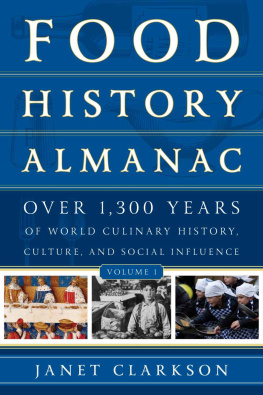


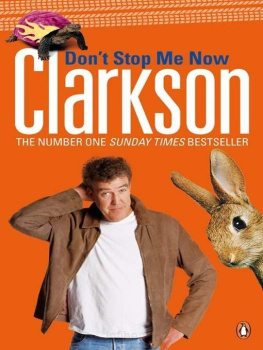




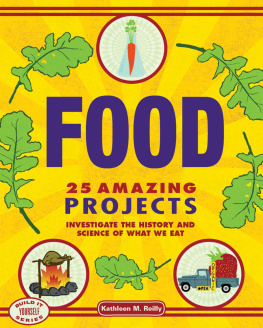
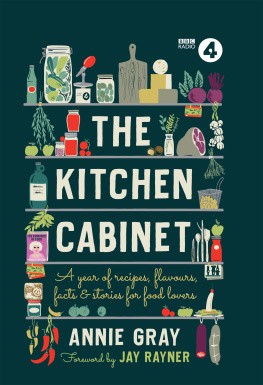
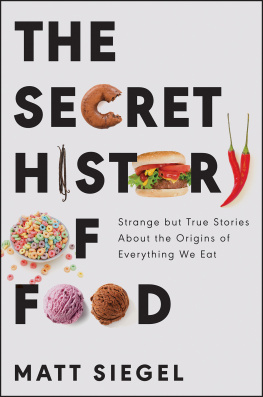
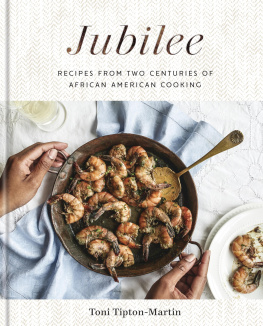
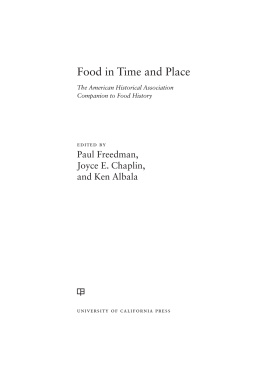
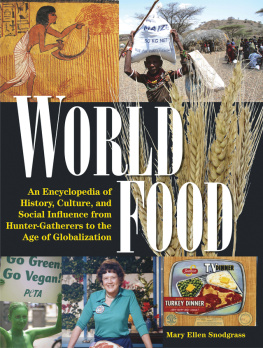
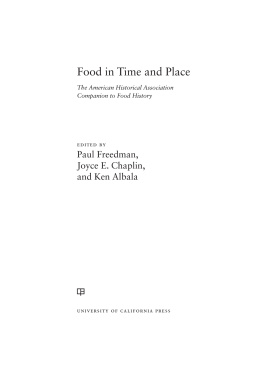
 TM The paper used in this publication meets the minimum requirements of American National Standard for Information Sciences Permanence of Paper for Printed Library Materials, ANSI/NISO Z39.48-1992.
TM The paper used in this publication meets the minimum requirements of American National Standard for Information Sciences Permanence of Paper for Printed Library Materials, ANSI/NISO Z39.48-1992.